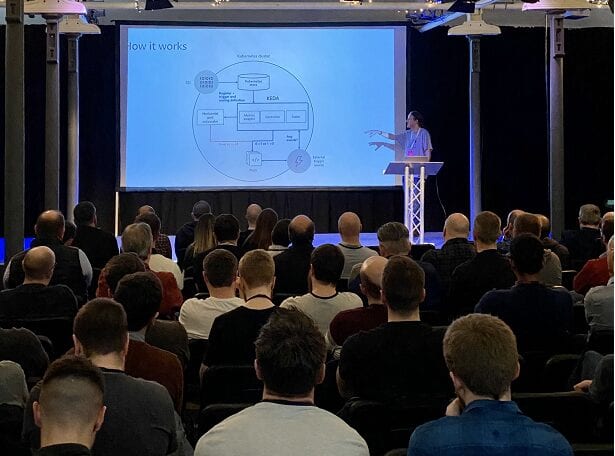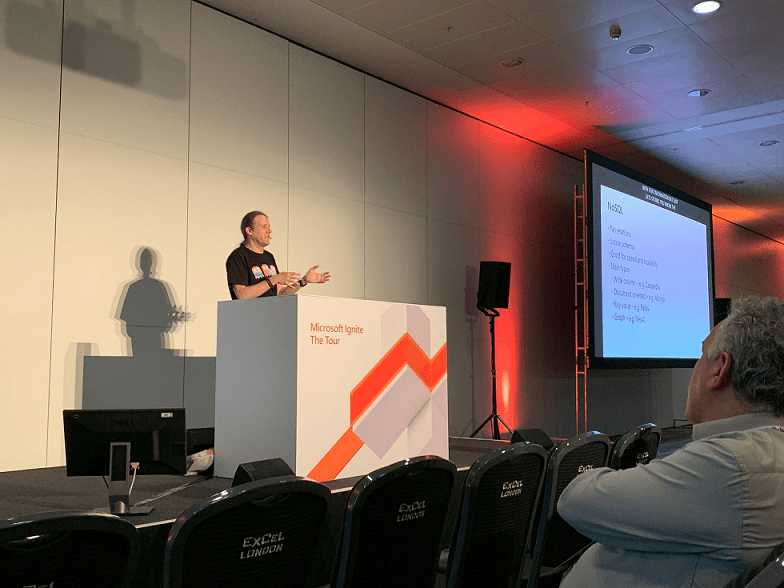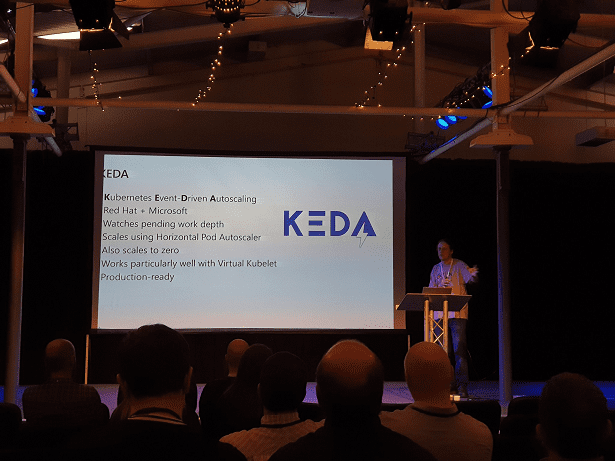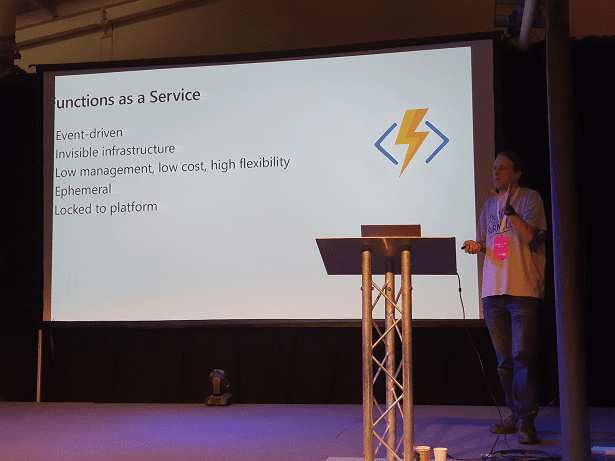Interview with Mark Allan, an Azure Cloud Expert and a Microsoft Azure MVPduring Microsoft Ignite The Tour in London
The following video has the complete interview:
Intro
Welcome to community interview episode (4).
Our community interview is all about Standing on the shoulders of giants! This is a metaphor which means “Using the understanding gained by major thinkers who have gone before in order to make intellectual progress”.
So, our giant in this episode is Mark Allan, an Azure Cloud Expert and a Microsoft Azure MVP Mark has more than 35 years of experience and has impressive experience with cloud computing, containers, serverless, and other trending technologies. A few insights from Mark’s sessions/talks:
It was a great interview full of passion, knowledge, experience, and enthusiasm.
Mohamed: Hello everyone! Welcome to the community interview. We are here at Microsoft Ignite The Tour in London and I have here Mark Allan. Hello Mark! It’s really good to have you here!
Mark: Yeah, it’s good to be here. I come over from Ireland to be here.
Mohamed: That’s great! Can you give us an introduction about yourself, what you are doing? Where are you based?
Mark: I’m actually based in Ireland and what I do these days is, I help companies get their stuff into the cloud, their code and data into the cloud. I’ve actually been a developer for about 35 years now and these days obviously it’s not just developments as you know DevOps, data, and infrastructure and all that sort of stuff going on as well. At the moment, I’m working on a project where the UK has a census every 10 years and the next one is coming up next year. So, I’m working with a company that has a product where they go out and collect information, but this is for small companies. So, this has always been an on-premises based thing, but they’ve got the contract to work on the UK census which obviously is covering the entire country. By law, everybody has to return the form. So, they’ve got 40,000 people going out into the field and knocking on doors and things. So, what I’m doing is to help that company get all their stuff into the cloud, so they can scale it up to the size that it needs to be to drive the UK census, that’s the sort of thing I do to help people scale up.
Mohamed: That’s great! Can you give us an introduction about the topics that you are presenting in this event?
Mark: There are two topics I’m presenting tomorrow. The first one is about Cosmos DB. So, it really explains what a NoSQL database is, how Cosmos DB fits into the landscape, why it’s such a good NoSQL database, and also explaining some of the nice little things that you can do with it, which you don’t necessarily think about when you just think database. The other one I’m talking about is called—it’s a slightly clickbait title—but it’s called Containers vs. Serverless. So, I’m talking about Azure Functions versus Azure Kubernetes Services, and how you can actually get Serverless stuff running in AKS. So, that you can get the best of both worlds.
Mohamed: So, why do you think it is important to understand containers vs. Serverless?
Mark: Well, basically, Serverless is a great new paradigm, it allows you to scale up in a way that you never could before. It’s great for small companies that might get large because you really only pay for the amount of stuff you are using but it automatically happens. So, you don’t have to keep switching sliders or provisioning more stuff. AKS is a little more traditional, containers are great because you can pretty much lift anything you want, and put it into a container and then run it anywhere be it on-premises, in the cloud, or on the edge. However, Kubernetes has traditionally been more of an API-driven thing, with a more static approach, but what’s nice about it, is that portability and that ability to run any code that you want. So, you know what I’m trying to do, is to show how you can get the benefits of containers but also get the benefits of an event-driven Serverless scalable thing going.
Mohamed: So, how do you see the future for containers and Serverless? What are the things that you expect?
Mark: The main problem that people have at the moment with Kubernetes, it’s heavyweight infrastructure, it’s not something that you can just easily walk into it, say okay, I’ve got some containers, I’ll just run them in Kubernetes. There’s a lot of stuff going on in there. It gets quite complex, you need people who understand this and can run the Ops, where I would expect to see it going is people are trying to sort of simplify it so, it becomes more of the sort of an underlying concern. So, in the same way, Serverless has essentially got rid of the fact that you are running on servers and you no longer need to care what servers are running on or maintain them, you just know essentially it handles all. Kubernetes is starting to go the same way where people are trying to build simpler layers on top of that. So, although it’s still running Kubernetes under the covers, something more understandable and more easily provisionable is on top of it, you know that’s certainly where Microsoft seems to be pushing things at the moment.
Mohamed: How do you see cloud computing in the past, present, and in the future in terms of adoption and development?
Mark: This is an interesting question because back in the day, you know you’ve heard the phrase the cloud is just somebody else’s computer and for a while, it was. When it was just infrastructure-as-a-service, you know yeah this does start the days of the cloud, people were really just saying okay, here’s my VM this thing, just put my VM run it in the cloud and essentially use the cloud as a data center. Now, Azure came at it from a slightly different point of view, they started with no VMs at all, it was all what is now App Service. So, it was all platform-as-a-service stuff. So, you would take your website and database and deploy it up and it would handle the underlying infrastructure for you. Gradually people are starting now, even the ones who’ve been just thinking of it as an infrastructure thing, they’re realizing the stuff you can do in the cloud, which makes their life easier, and gives you a lot more power and really starts to make use of the sort of huge elasticity and the huge power that you can get out of the cloud. So, that’s where people seem to be starting to head now, is to get rid of the VMs and move much more towards cloud-native services and to platform and to software-as-a-service running in the cloud. So, that’s where things are generally going, we’re starting to drop the caring about what you’re running on, adjusting really get the code out there and get it running, get the data uploaded and you know, let the cloud handle things that you don’t want to have to handle.
Mohamed: So, are you expecting more adoption?
Mark: Oh! Absolutely yes. Every company is looking at moving to the cloud, there’s one or two that are still clinging on for dear life to their VMs, their data center in on-premises, some of the larger and more established and slower-moving companies, but even those companies now, are moving lock, stock, and barrel into the cloud. Banks and other large institutions have started to cross the Rubicon. So, they’ve started one of them and you know jumped and said okay, we’re moving to the cloud so all the other ones say…
For the rest of the answer and other questions/answers, please watch the video.




